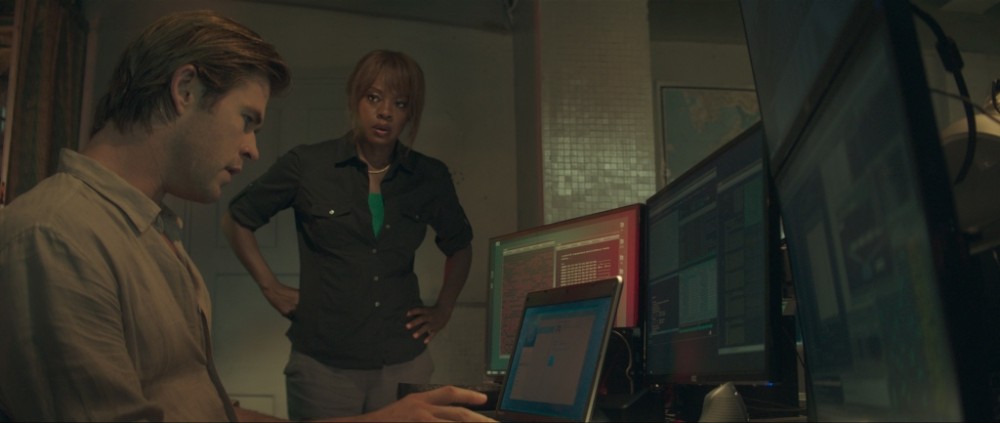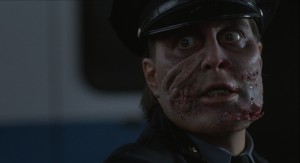
Michael Mann’s first act in Blackhat is to make the perpetually uncinematic, presumed virtual world of computer hacking both visually arresting and physically tangible with a sequence that zooms through a series of wires, traveling lights and computer infrastructure, sort of like 2001’s stargate sequence only with tactile surfaces in the place of a rush of light. In doing so, Mann collapses the imagined barrier between cyberspace and physical reality. Cybercrime isn’t achieved solely through trips through binary matrices or remote, untraceable access as it had been in schlock of the past, but is facilitated by physical action as trojans are delivered via USB and bluetooth transmitters are nothing without someone to plant them somewhere. Here cyberwarfare, like physical warfare, is driven by force and as a Michael Mann film, Blackhat isn’t wanting for motivated muscle.
Like the many ex-cons of Mann’s filmography, musclebound hacker Nick Hathaway (Chris Hemsworth) isn’t running from his past so much as he is running towards his future, roughly defined here, as always, as domestic life with a woman — this time in the form of Chen Lien (Tang Wei). On loan to a joint American-Chinese taskforce headed up by Carol Barrett (Viola Davis) and Chen Lien’s brother Dawai (Wang Leehom), Hathaway leaves his past vague save a few rough details, and is focused on wholly on the task at hand. In prison he did “his own time” with an obsessive workout regimen and a reading list that included Foucault and Baudrillard, and he intends to do his own time now with a much clearer end goal. As ever, time is luck, but Hathaway must make his own.
The focus on the present moment accentuates the focus on tactile sensuousness ever present in Mann’s style, as he conveys a sense of touch through the image. Freedom, in the form of an airstrip, is still hazy to Hathaway until Chen Lien’s hand on his arm makes it all clear. Their sudden romance follows in such fashion, what they say to one another is unimportant — check the dialogue mixed way low — all chemistry and electricity is demonstrated through touch, their nerves and emotions bared as the electrical circuits they really are. The difference between their first touch and the extra loud keystroke that sets off the film’s opening act of terrorism is, in this way, minimal.
Further, Mann’s sensuous in-the-moment style comes through in both his action and his increasingly common digital experimentation. When we visit the site of the film’s initial explosion, the film takes on a DV look to imitate the proliferation of news, a choice which reappears in the first big shootout though it mimics viral video there. This level of visual experimentation in a studio action film (arguing that a stock footage watermark in one shot is simply a mistake no one involved in this $70 million production is, frankly, boring and condescending) is a welcome change of pace from a landscape that increasingly frowns on idiosyncrasy.
On the action front, a fight in a Chinese restaurant is filmed shaky and cut chaotically so as to enrapture the viewer in a sensory experience. It’s a common but rarely successful technique as it so often obfuscates the action rather than enhance it. Mann’s stylistic decisions make it work in Blackhat as action so often takes on a smooth motion look that seems to approximate the high frame rate of a sports broadcast. This usually derided look is gorgeous here, especially in the torchlit climax, and lends a kineticism to all violence on display. And the gunfights, too, are all the better for the style with which they’ve been injected. Gunshots are typically loud and bullets tear into their targets with thudding force, thanks to a combination of slow motion and great sound design. The same tactility that defines the film’s romanticism seeps into its violence, lest it become cold-blooded.
Despite the flourishes and visual directorial signatures throughout, Blackhat never descends into empty formalism as every touch serves a certain sensuality. Mann has crafted the most romantic film ever made about computers.
—
Blackhat is playing in theatres everywhere.
Directed by Michael Mann; written by Morgan Davis Foehl; starring Chris Hemsworth, Wang Leehom, Tang Wei, Viola Davis, and Holt McCallany; 133 minutes.



 Derek
Derek
 Isabelle
Isabelle